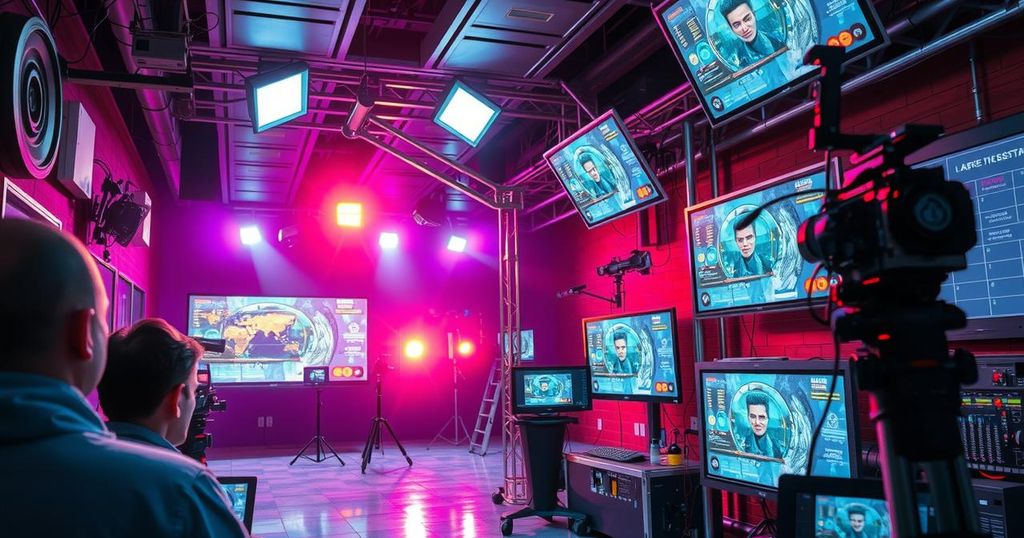How AI is Transforming the Future of Filmmaking in India
Artificial Intelligence is significantly influencing Indian filmmaking, with directors like MG Srinivas exploring its applications in de-aging and voice cloning. While the technology offers exciting opportunities, it raises ethical and copyright concerns that filmmakers must navigate carefully. AI’s integration into the industry is growing, promising a future filled with potential as long as storytelling remains the priority.
In the enchanting world of Indian filmmaking, Artificial Intelligence (AI) is swiftly becoming a creative companion to visionary directors. Renowned Kannada filmmaker MG Srinivas has harnessed AI over the past year, exploring everything from scripting to de-aging actors. His ambitious efforts in de-aging actor Shiva Rajkumar for his film Ghost (2023) led him to establish a partnership with an Iranian VFX company in Bengaluru, marking a new era for visual effects in South cinema.
Srinivas was inspired to experiment with de-aging after witnessing the captivating visual effects in the Hollywood film Gemini Man. He acknowledges the limitations of Indian films’ budgets compared to Hollywood but believes technology has improved significantly. To achieve lifelike portrayals of past legends like Rajkumar and Puneeth Rajkumar, Srinivas is keen to integrate AI into his future projects, much to the delight of fans who long for nostalgic appearances on the big screen.
AI’s magic doesn’t stop at visuals; it extends to voice cloning as well. Srinivas utilized AI to clone Rajkumar’s voice for multilingual dubs of Ghost. His venture, AI Samhitha, specializes in voice cloning and has already collaborated on various projects, including the upcoming Bhairathi Ranagal (2024). The demand for voice cloning is surging, and Srinivas is now focused on perfecting lip-syncing to create a seamless viewing experience.
Even as excitement surrounds AI technology, writers like Sumit Purohit recognize its growing pains in Hindi cinema. Purohit notes issues with continuity in AI-generated characters, highlighting an evolving technology that still struggles with consistency. He uses AI tools in his work, viewing them as helpful assistants to enhance creativity rather than replacements for human artists.
Chaitanya Chinchilkar of Whistling Woods International agrees that AI has long been part of filmmaking. Today, it plays a critical role in previsualization, storyboarding, and other production processes. As AI models gain familiarity with Indian datasets, they’re becoming increasingly valuable to filmmakers, allowing for a more tailored approach to content creation.
While the integration of AI presents thrilling opportunities, ethical concerns arise related to job security and copyright. Director Vivek Anchalia, who created a full-length AI film, emphasizes the need for responsible practices, ensuring he does not infringe on anyone’s privacy in his creative endeavors. The discussion on ethical AI use in filmmaking is crucial as the industry grapples with technology’s rise.
Copyright issues have also come to the forefront, highlighted by court cases involving Bollywood stars like Amitabh Bachchan and Anil Kapoor who sought protection against unauthorized uses of their likenesses. Current legal frameworks in India provide some reassurance, but ongoing discussions about personality rights must evolve alongside AI advancements.
As the film industry adapts, the potential for job displacement exists, yet it could also create new employment opportunities in AI-centric roles, as directors like Srinivas foresee the demand for tech-savvy artists growing. Critics of AI express concern about losing the emotional quality that human creators bring to storytelling, advocating for a balance where AI serves as a tool rather than the primary artisan.
In this ever-evolving landscape, filmmakers are encouraged to view AI as a revolutionary asset, one that enhances storytelling without overshadowing the very narratives they wish to convey. The future of Indian cinema, underpinned by AI, holds great promise, provided that artists remain vigilant in navigating its complexities and limitations.
As Indian filmmaking embraces the transformative power of AI, it faces both exciting possibilities and significant challenges. Directors like MG Srinivas pioneer the way, integrating advanced technologies into their craft while being acutely aware of ethical considerations and the necessity for responsible use. By fostering creativity through AI, the industry stands at a crossroads, able to enhance stories while ensuring the essence of human artistry remains unblemished amid the technological revolution.
Original Source: thefederal.com




Post Comment